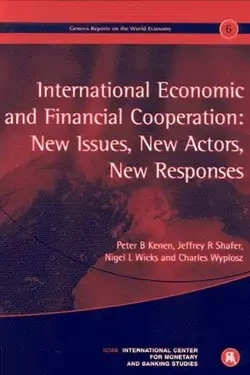
International Economic and Financial Cooperation
New Issues, New Actors, New Responses

- Book
- Foreign policy analyses written by CFR fellows and published by the trade presses, academic presses, or the Council on Foreign Relations Press.
More on:
The machinery of international economic and financial cooperation is rapidly becoming obsolete. Written by a group that combines extensive practical experience and analytical sharpness, the sixth title in the Geneva Reports on the World Economy series presents an overview of how cooperation has evolved, identifies its current limitations, and advances a number of proposals.
The winds of change are powerful. The set of key players has expanded, including several emerging economic and financial giants that have long been sidelined. A decade ago, a number of today's systematically important currencies either did not exist or were insignificant. The issues are changing as globalization calls for global answers in many old and new areas. The set of policies has also evolved. We now live in a world of low inflation and integrated financial markets where monetary policies are mostly dedicated to domestic concerns, fiscal policies are highly constrained, and financial regulation and supervision are becoming ever more sophisticated
Cooperation arrangements have been driven by pragmatism and effectiveness. They have worked reasonably well for a long while, but the need to combine these considerations with legitimacy, representativeness, and accountability is now growing. This is a challenging task, and that is why there exist only few formal institutions and many informal arrangements. This challenge is vividly illustrated by discontent with the governance of the IMF and growing resistance to the agenda-setting role of the G7, which is impairing its effectiveness.
The Report makes the following recommendations:
- Room must be made for new players while preserving effectiveness. The solution is to streamline European representation in existing bodies such as the IMF Executive Board and G7, thus making room for the new significant players.
- A new grouping, the G4, consisting of the key currency countries (the United States, the euro zone, Japan, and China) should now be called upon to play the leadership role in dealing with exchange rate adjustments that used to be filled by the G7.
- For most other global issues, the G4 cannot replace the G7 and yet the G7's effectiveness is being undermined by its diminishing legitimacy and representativeness. An "Independent Wise Persons Review Group" should be asked to examine the situation and propose ways to streamline the operations of the many international bodies created over the last decades, possibly recommending that some be disbanded.
- The IMF will undoubtedly continue to play a central role, but it now needs to go through a new phase of reengineering. The report proposes changes in the composition of the Executive Board and ways to upgrade its role. The composition of the Board should be brought into better alignment with the relative economic importance of individual IMF members. The senior official dealing with Fund issues in a country's capital should serve as that country's Executive Director.
- A new body, the Council for International Financial and Economic Cooperation (CIFEC), should serve as the agenda-setting body, providing strategic direction for the functioning and development of the international financial system and exercising informal oversight over the various multilateral institutions and forums involved in international economic cooperation. It would have few members, "no more than fifteen", but include all of the systematically important countries, represented by their finance ministers. The Secretary-General of the UN, the Managing Director of the IMF, the President of the World Bank, and the Director General of the WTO would be invited to its meetings.
More on:
 Online Store
Online Store